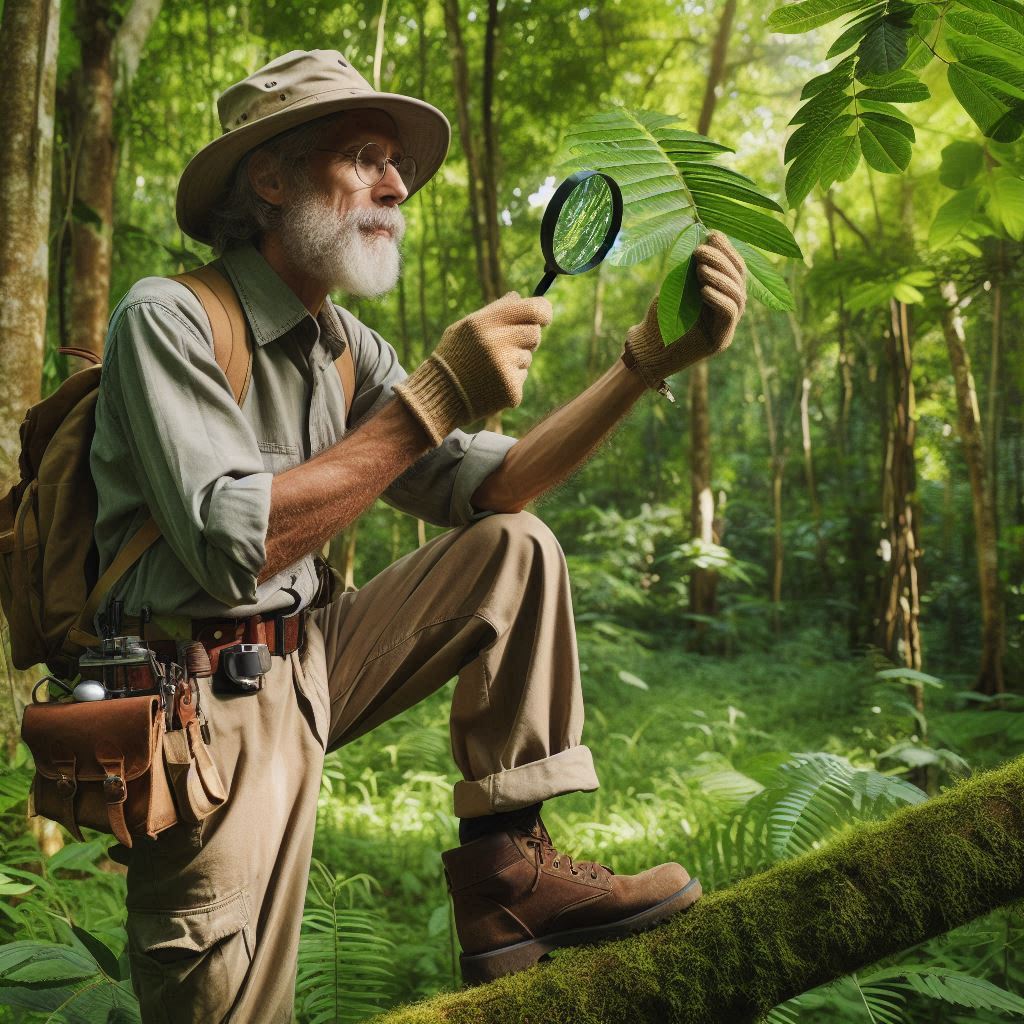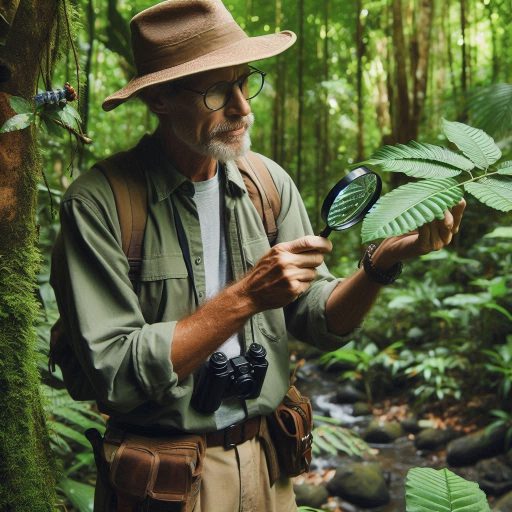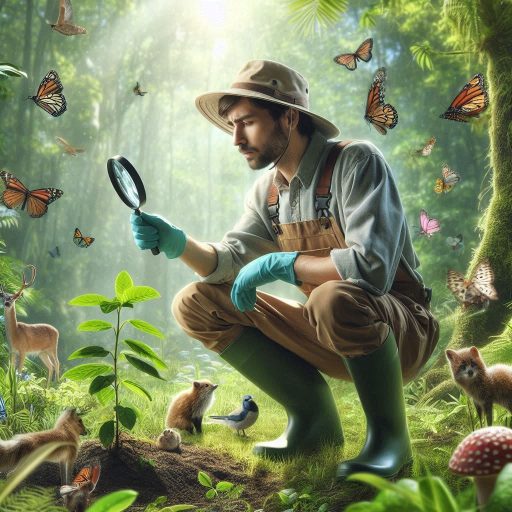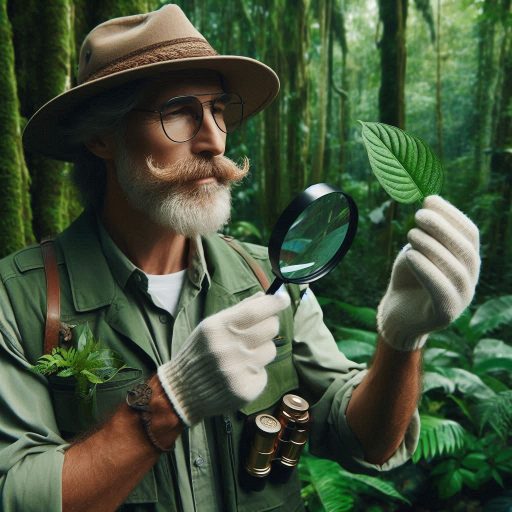Introduction
A research ecologist plays a vital role in studying the interactions between organisms and their environments.
Their work focuses on understanding ecosystems, biodiversity, and the impact of various factors on natural habitats.
Research ecologists are deeply involved in gathering and analyzing data related to species behavior, population dynamics, and environmental changes.
Their studies aim to understand how ecosystems function, which helps predict how these systems will respond to disturbances such as pollution, habitat destruction, or climate change.
Through a combination of fieldwork, laboratory experiments, and data analysis, research ecologists contribute essential insights that guide environmental protection efforts.
The importance of research ecologists in studying and preserving the environment cannot be overstated.
Their work provides the scientific foundation for conservation policies and strategies aimed at protecting ecosystems and preserving biodiversity.
Research ecologists identify critical threats to species and habitats, such as habitat loss, pollution, and overexploitation.
By studying these threats, they offer solutions for mitigating damage and restoring ecological balance.
Their research directly informs actions to safeguard endangered species, rehabilitate damaged ecosystems, and promote sustainable land-use practices.
Research ecologists also play a significant role in addressing the global challenge of climate change
Morning Routine
Wake up and Have Breakfast
A research ecologist‘s day begins early.
Most ecologists wake up at dawn to make the most of daylight.
After waking, the ecologist enjoys a nutritious breakfast.
Fieldwork requires stamina, so a balanced meal is essential.
Many ecologists opt for high-energy foods like eggs, fruits, and whole grains.
These foods help maintain energy levels throughout the day.
Hydration is also critical, and many ecologists drink plenty of water before starting their day.
The morning routine also helps the ecologist mentally prepare for the tasks ahead.
A calm, focused start allows them to organize their thoughts and set clear goals for the day.
Review the Day’s Research Plans
After breakfast, the ecologist reviews the day‘s research plans.
This step is crucial for ensuring that fieldwork proceeds smoothly.
The ecologist carefully examines the objectives for the day.
Whether studying wildlife populations or monitoring ecosystems, each project requires a clear focus.
They review data from previous days to guide their current observations.
The ecologist may also check weather conditions and terrain for the day‘s fieldwork.
Weather can affect the success of outdoor research, so proper planning is necessary.
Reviewing the research schedule also helps the ecologist ensure that they meet project deadlines.
Communication with team members is key at this stage.
The ecologist may touch base with colleagues or assistants to confirm everyone‘s roles.
Efficient planning ensures that fieldwork will be as productive and efficient as possible.
Prepare Necessary Equipment and Tools for Fieldwork
Once the day‘s plans are in place, the ecologist gathers the necessary equipment for fieldwork.
Tools vary depending on the type of research being conducted.
For example, ecologists studying wildlife may carry binoculars, GPS devices, and cameras.
In contrast, those studying plant ecosystems might use soil sampling kits and measuring tapes.
Preparation is vital, as fieldwork often occurs in remote locations.
The ecologist ensures that all equipment is functional before leaving.
This may include checking batteries, calibrating instruments, or testing communications devices.
The ecologist also prepares safety gear, especially for rugged or hazardous environments.
This can include first-aid kits, protective clothing, and hiking boots.
Preparing for unexpected situations is crucial, particularly when working in wilderness areas.
Packing necessary supplies, such as water, snacks, and sunscreen, is also important.
The ecologist needs to stay hydrated and energized while in the field.
Once everything is packed and ready, the ecologist sets out for the research site.
By thoroughly preparing their equipment and reviewing plans, the ecologist maximizes the potential for successful research.
Basically, a research ecologist‘s day involves careful planning and preparation.
Starting the day with a healthy breakfast, reviewing research objectives, and organizing essential tools are key steps.
These actions set the foundation for effective and productive fieldwork.
Read: Earning Potential: Chemist Salaries Across US States
Fieldwork
Head to the Research Site
A research ecologist‘s day often begins with heading to the research site.
Early mornings are typical, as many species are most active during this time.
The location of the site varies depending on the focus of the study.
It could be a dense forest, a coastal area, or a remote mountain range.
Ecologists may travel long distances, sometimes hiking or using specialized vehicles to access their sites.
Preparation is crucial.
They ensure they have all necessary equipment like GPS devices, field notebooks, and sampling tools.
Each site visit is carefully planned to optimize the time spent in the field.
Once at the research site, ecologists assess the area before starting their tasks.
Environmental conditions such as weather and light can influence the data collection process.
Being adaptable to these changes is essential.
Ecologists work outdoors in various conditions, often exposed to unpredictable elements.
Despite the challenges, they remain focused on gathering accurate, reliable data.
Collect Data on Plant and Animal Populations
Data collection is the primary focus for ecologists in the field.
They monitor and document plant and animal populations in detail.
Depending on the project, they may focus on specific species or entire ecosystems.
Ecologists often use various methods to collect data, such as direct observation, trapping, or using cameras.
They meticulously count plant species or track animal movements.
Tracking devices may be used to monitor animal behavior and migration.
For plant studies, ecologists measure growth rates and study soil conditions.
The data collected helps understand biodiversity, population trends, and the health of ecosystems.
Ecologists also rely on technological tools such as drones or infrared cameras to gather information on hard-to-reach areas.
Each piece of data is crucial for long-term conservation efforts.
The information ecologists gather can indicate changes in ecosystems, such as species decline or habitat degradation.
Their work helps inform strategies to protect these populations.
Record Observations and Take Samples for Further Analysis
Recording detailed observations is essential for later analysis.
Ecologists use notebooks, voice recorders, or tablets to document everything they observe in the field.
They note environmental factors like temperature, humidity, and soil type.
These factors play a significant role in interpreting the data they collect.
In addition to observational data, ecologists take physical samples from the environment.
This can include soil, water, plant leaves, or animal fur.
These samples are brought back to the lab for further testing.
Laboratory analysis provides deeper insights, such as genetic studies of species or chemical analysis of soil composition.
Each sample adds another layer of understanding to the field data.
The combination of field observations and lab analysis helps ecologists make evidence-based conclusions.
These conclusions guide conservation efforts and influence environmental policies.
Therefore, a research ecologist‘s day involves heading to the field, collecting vital data, and recording detailed observations.
Each task contributes to understanding and preserving ecosystems.
Read: Key Roles and Responsibilities of a Chemist in the US
Transform Your Career Today
Unlock a personalized career strategy that drives real results. Get tailored advice and a roadmap designed just for you.
Start NowData Analysis
Return to the Lab or Office
After completing fieldwork, research ecologists return to the lab or office to begin data analysis.
This step is essential to transform raw field data into actionable insights.
Whether you’re studying animal behavior, plant growth, or environmental changes, data organization is key to making sense of your observations.
Once back in the lab or office, the focus shifts from outdoor tasks to more technical work.
Ecologists unpack equipment, sort collected samples, and prepare their workspace for data input and analysis.
Maintaining accurate records from fieldwork is crucial during this phase to avoid errors.
Input Data into Computer Software for Analysis
Next, research ecologists input data into computer software programs designed for analysis.
Programs like R, Excel, or SPSS are often used to organize and analyze ecological data.
These tools help ecologists manage large datasets, ensuring that every detail is accounted for.
Data entry requires precision.
Ecologists carefully input the information gathered from the field, including species counts, environmental conditions, or sample measurements.
Each entry must be accurate to ensure the analysis is reliable.
Once the data is entered, the software can process it and run various statistical tests.
These programs allow ecologists to examine relationships between variables, check for outliers, and validate the quality of their data.
Data visualization tools also play a critical role, helping ecologists create graphs, maps, and charts to illustrate their findings.
Review Data and Look for Patterns or Trends
After inputting the data, research ecologists review their findings to look for patterns or trends.
This is where the core analysis of the research begins.
Ecologists examine how different variables interact, identifying key trends that may explain ecological phenomena.
For example, an ecologist studying a wetland might analyze water quality, vegetation growth, and animal population numbers.
By comparing this data over time, they can identify how changes in water levels affect biodiversity in the area.
Discovering these patterns helps inform future conservation efforts and scientific research.
Recognizing trends is crucial for understanding ecosystem dynamics.
Ecologists use this information to develop hypotheses or recommend environmental management strategies.
For instance, if the data reveals that rising temperatures impact plant growth, it can help inform climate change mitigation plans.
Collaboration also plays a role at this stage.
Ecologists often consult with colleagues or specialists to validate findings and explore alternate interpretations of the data.
This exchange of ideas enhances the accuracy and depth of the research.
In review, the day of a research ecologist involves returning to the lab or office to input and review data.
Precision in data entry and analysis is essential for identifying meaningful patterns and trends.
This process ultimately leads to deeper ecological insights and supports impactful conservation decisions.
Read: US Chemistry Conferences and Symposiums to Attend in 2024

Collaboration
Meet with team members to discuss findings
A typical day for a research ecologist often begins with meeting with team members to discuss findings.
These meetings are crucial for sharing data collected during fieldwork or lab experiments.
Each member brings valuable insights, contributing to a better understanding of the ecosystem being studied.
Research ecologists review data trends, highlight anomalies, and propose interpretations based on their observations.
The team meetings foster collaboration.
They allow everyone to ensure that research goals are aligned and moving in the right direction.
Ecologists use this time to refine methodologies, ensuring data accuracy and consistency.
These discussions help the team identify knowledge gaps and areas requiring more focused research.
Regular team meetings keep the entire project on track and ensure all members are updated on progress.
Share Insights and Brainstorm Ideas for Future Research Projects
After discussing current findings, ecologists share insights and brainstorm ideas for future research projects.
The research field is dynamic, requiring constant adaptation and innovation.
Ecologists must think critically about emerging environmental challenges, such as climate change or species extinction.
These brainstorming sessions are crucial for generating fresh ideas that push the boundaries of ecological science.
Research ecologists constantly ask questions like, “What have we missed?” or “How can we further expand on this data?” Such inquiries spark innovative research proposals.
Collaborating with colleagues also ensures diverse perspectives are considered.
This approach helps generate new hypotheses and research avenues.
The goal is always to advance knowledge in the field of ecology while addressing pressing environmental issues.
Future research projects often emerge from gaps identified in current studies.
Whether it’s investigating new ecosystems, exploring species behavior, or studying human impacts on biodiversity, research ecologists rely heavily on creativity.
This phase of the job requires ecologists to apply critical thinking and problem-solving skills.
Brainstorming sessions result in actionable research plans for the future.
Collaborate with Scientists from Other Disciplines for Interdisciplinary Research
An essential part of a research ecologist’s day involves collaborating with scientists from other disciplines for interdisciplinary research.
Ecological problems are often complex and interconnected, requiring expertise beyond ecology alone.
Research ecologists frequently collaborate with climatologists, hydrologists, geologists, and other specialists to conduct interdisciplinary studies.
These collaborations broaden the scope of research and lead to more comprehensive conclusions.
Interdisciplinary research projects allow ecologists to explore how different environmental factors interact.
For example, understanding how changes in climate affect ecosystems requires knowledge of both ecology and meteorology.
By working alongside scientists from other fields, ecologists gain new insights and strengthen their own research outcomes.
This teamwork is essential for producing well-rounded, impactful research.
Collaboration also fosters innovation.
Scientists from different backgrounds bring unique perspectives, often suggesting new ways to approach ecological challenges.
These partnerships lead to groundbreaking research that addresses complex environmental issues holistically.
Successful interdisciplinary projects allow research ecologists to apply ecological principles to broader scientific contexts.
Read: Continuous Learning: Post-graduate Options for US Biologists
Writing and Publishing
After completing the fieldwork and analyzing data, the next crucial step for a research ecologist is writing and publishing their findings.
This process is vital for sharing new knowledge with the scientific community and contributing to the advancement of ecology as a science.
Drafting Research Papers
Research ecologists start by drafting research papers based on their findings.
These papers serve as a detailed account of the study, outlining the research question, methodology, results, and discussion of the implications of the findings.
The drafting process requires careful attention to detail and clear communication of complex scientific concepts.
Researchers must ensure that their papers adhere to the formatting and style guidelines of the target journal.
This may involve including specific sections like an abstract, introduction, methods, results, discussion, and references.
Each section must be written with clarity and precision to effectively convey the research findings.
Reviewing and Editing Papers
Before submitting their research papers for publication, ecologists often engage in a thorough review and editing process.
This step is essential for ensuring the accuracy, coherence, and quality of the manuscript.
Researchers may seek feedback from colleagues, mentors, or collaborators to improve their papers.
During the review process, researchers carefully check the accuracy of data, analysis, and interpretation presented in the paper.
They also pay close attention to the overall structure and flow of the manuscript, making revisions to enhance clarity and coherence.
Editing for grammar, spelling, and punctuation errors is also crucial to ensure the professionalism of the final product.
Submitting Papers for Publication and Peer Review
Once the research papers are finalized, researchers submit them to scientific journals for publication.
This submission process involves selecting an appropriate journal that aligns with the research topic and scope of the study.
Researchers must ensure that their papers meet the specific requirements and guidelines of the chosen journal.
After submission, the papers undergo a rigorous peer-review process, where experts in the field evaluate the quality and validity of the research.
Peer reviewers provide constructive feedback on the manuscript, suggesting revisions or improvements to strengthen the scientific content.
Researchers must carefully address the reviewers’ comments and make necessary revisions before resubmitting the paper for further review.
Overall, writing and publishing research papers is a crucial aspect of a research ecologist’s work.
By effectively communicating their findings through publications, ecologists contribute to the collective knowledge and understanding of ecological processes, biodiversity conservation, and environmental sustainability.
Continuing Education
Attend Conferences and Workshops in the Field
As a research ecologist, attending conferences and workshops is a vital part of professional growth.
These events provide opportunities to share findings, collaborate with peers, and stay informed on the latest advancements.
Ecologists regularly engage in discussions about emerging trends and ecological challenges at these gatherings.
By attending workshops, ecologists can also enhance practical skills that can be directly applied to their fieldwork or research.
Networking at conferences allows ecologists to build valuable professional connections, which often lead to new research projects or collaborations.
The knowledge gained from these events helps shape the direction of future research.
Conferences often feature keynote speakers who are leaders in ecology, offering insights into the latest research breakthroughs.
Staying active in such events keeps ecologists at the forefront of scientific innovation.
These events are also a great way to present their own work, receive feedback, and refine their research methods.
Stay Updated on the Latest Research and Technological Advancements
In addition to attending conferences, research ecologists must constantly stay updated on the latest scientific advancements.
Research in ecology evolves rapidly, with new discoveries and technologies emerging regularly.
Ecologists read scientific journals, follow academic publications, and engage with the research community to remain informed.
This practice helps them incorporate the newest data and methods into their work.
Accessing cutting-edge research ensures that ecologists apply the best available practices to address pressing ecological issues.
Technological advancements also play a significant role in modern ecological research.
Tools like remote sensing, satellite imagery, and data analysis software have revolutionized the field.
Research ecologists actively adopt these technologies to improve data collection and interpretation.
Staying updated on technological innovations helps ecologists enhance their research quality, making their findings more accurate and actionable.
Moreover, keeping up with trends allows ecologists to explore innovative research approaches.
For example, new software can streamline data analysis, while improved field equipment enhances the precision of measurements.
Incorporating these advancements into daily work improves both efficiency and results, pushing the boundaries of what is possible in ecological research.
Pursue Further Education or Certifications to Enhance Skills
Continuous learning is essential for research ecologists.
To stay competitive, many pursue further education or certifications.
Advanced degrees, such as a master’s or Ph.D., provide deeper knowledge and open doors to leadership positions.
Specialized certifications in areas like geographic information systems (GIS) or environmental management can also enhance an ecologist‘s skill set.
These certifications validate their expertise in specific areas, making them more attractive to employers or funding bodies.
Further education not only strengthens an ecologist‘s scientific foundation but also allows them to explore new research methods.
Many ecologists enroll in online courses or attend workshops to expand their skills.
This commitment to learning helps them stay current in the ever-evolving field of ecology.
Generally, a day in the life of a research ecologist involves attending conferences, staying informed on the latest advancements, and continuously enhancing skills through education.
These activities are crucial for success in the dynamic and demanding field of ecological research.
Showcase Your Business Today
Reach thousands of readers actively exploring professional services. Publish your business profile and grow your audience now.
Publish NowOutreach and Education
Present Research Findings at Conferences or Public Events
Research ecologists often share their findings at conferences and public events.
Presenting research allows ecologists to showcase their work and contribute to the scientific community.
These presentations also provide an opportunity to receive feedback from peers and experts.
Conferences often highlight new ecological trends, advancements, and global challenges.
Research ecologists must prepare clear and engaging presentations.
They distill complex data into digestible formats for various audiences.
At these events, they may present to other researchers, students, and even government officials.
The feedback received helps refine ongoing research or sparks new projects.
Public events also offer a platform to engage with non-scientists.
Research ecologists play an essential role in raising environmental awareness.
By explaining their findings in accessible terms, they educate the public on critical environmental issues.
These presentations help create a connection between scientific research and real-world ecological challenges.
Engage with the Public Through Outreach Programs or Educational Initiatives
Engaging with the public is an important part of a research ecologist’s role.
They often participate in outreach programs designed to raise awareness about ecological conservation.
These programs take place in schools, community centers, and nature reserves.
Research ecologists use these opportunities to educate people of all ages on ecology and environmental issues.
Ecologists frequently collaborate with local organizations and government agencies.
These partnerships help create impactful educational programs that resonate with diverse audiences.
Public engagement efforts aim to inspire communities to take action toward environmental sustainability.
Research ecologists also use social media, webinars, and blogs to reach wider audiences.
By making their research accessible to the public, ecologists build support for conservation initiatives.
This outreach fosters a deeper understanding of the importance of protecting ecosystems.
Whether they lead workshops, create educational content, or volunteer for local events, ecologists play a key role in public environmental education.
Mentor Students or Interns Interested in Research Ecology
Mentorship is another vital aspect of a research ecologist’s daily life.
Research ecologists often mentor students or interns who are passionate about ecology.
Through mentorship, they guide young professionals in developing critical research skills.
Mentors provide insights into conducting fieldwork, analyzing data, and designing research projects.
Mentoring allows research ecologists to share their experiences and foster the next generation of ecologists.
They help students understand the complexities of ecological research and offer advice on academic and career paths.
Many students benefit from learning about real-world challenges faced by research ecologists.
Mentorship often involves supervising students during fieldwork or lab projects.
Ecologists teach them best practices for data collection and environmental monitoring.
By encouraging hands-on experience, mentors prepare students for their future roles in the field.
This collaborative approach ensures students gain valuable knowledge, which helps advance their research careers.
In essence, a day in the life of a research ecologist involves diverse tasks.
Presenting research at conferences, engaging with the public, and mentoring students are integral parts of their role.
By doing so, they contribute to both the scientific community and the broader public’s understanding of ecology.
Uncover the Details: Astronomy Education: Teaching the Next Generation
Discover More: How Toxicologists Help in Environmental Protection
See Related Content: Famous Virologists and Their Groundbreaking Discoveries
Conclusion
In this blog post, we explored the typical day of a research ecologist, which is diverse and dynamic.
Research ecologists split their time between the field and the lab, engaging in tasks such as collecting samples, monitoring wildlife, and conducting experiments.
They spend hours in nature observing ecosystems, documenting environmental changes, and ensuring accurate data collection.
When they‘re not in the field, they analyze their findings in the lab, interpreting data to answer critical ecological questions.
The work of research ecologists is vital for environmental conservation.
Their findings contribute to the protection of endangered species, the preservation of habitats, and the management of natural resources.
By studying ecosystems and their interactions, research ecologists provide the scientific knowledge necessary for informed conservation policies.
Their research plays a crucial role in addressing the effects of climate change, habitat loss, and biodiversity decline.
If you‘re passionate about protecting the environment and enjoy scientific discovery, consider a career in research ecology.
This field offers a unique blend of outdoor exploration, problem-solving, and intellectual challenge.
Research ecologists have the opportunity to make a meaningful impact by contributing to solutions for pressing environmental issues.
With the increasing need for conservation efforts worldwide, this career path is more important than ever.
[E-Books for Sale]
The Big Book of 500 High-Paying Jobs in America: Unlock Your Earning Potential
$19.99 • 500 High-Paying Jobs • 330 pages
Explore 500 high-paying jobs in America and learn how to boost your career, earn more, and achieve success!
See All 500 High-Paying Jobs of this E-Book
1001 Professions Without a Degree: High-Paying American Jobs You Can Start Now
$19.99 • 1001 Professions Without a Degree • 174 pages
Discover 1001 high-paying jobs without a degree! Unlock career tips, skills, and success strategies for just $19.99!




